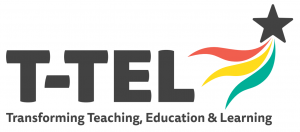
Group photo of participants
Transforming Teaching, Education & Learning (T-TEL) facilitated a one-day research training workshop for the newly constituted Research Desk of the Colleges of Education Weekly Journal (CoEWJ) on Thursday, February 10, 2022, at the T-TEL head office in Accra.
The Journal has raised the profile of Colleges of Education over the past few year by reporting on the significant changes that have taken place in teacher education, including the introduction of the B.Ed. degree in Initial Teacher Education and accompanying university affiliation.
The Research Desk is an independent wing of the Journal whose primary objective is to collect and analyse accurate data for news articles. The Research Desk is led by Rev. Sr. Elizabeth Amoako-Arhen, s the former Principal of OLA College of Education. She is well suited to this role because of her expert knowledge and understanding of teacher education.
The Journal requested T-TEL’s support to facilitate a capacity building training workshop for its Research Desk team as part of efforts to expand its work and produce well-informed news reports backed by research data.

Executive Director of T-TEL addressing participants before the training sessions
The training focused on:
1) Identifying research issues and framing research studies.
2) Conducting rapid and impactful research (including the Deep Dive Methodology).
3) Writing for impact to ensure that findings are presented effectively.
4) Communicating findings and engaging stakeholders and the media.
Facilitators of the sessions were Robin Todd, the Executive Director of T-TEL, Abdul-Karim Kadiri, T-TEL’s Research and Learning Coordinator and Mabel Viviey, T-TEL’s Communications and ICT Coordinator.
In attendance were Larry Agbador, Editor-in-Chief of CoEWJ, Rev. Sr. Elizabeth Amoako-Arhen (Research Desk Lead), Daniel Fenyi, Clarke Yalley, Daniel Adom-Fynn and Millicent Obodai and Lucy Adzo Kudjoe from the National Teaching Council.
The training was organized in three sessions. The first session focused on identifying and framing research issues or problems. Participants worked in groups of three and were presented with sample texts to tease out research problems. Each group presented their findings and their approach to framing their research problem.

A participant presenting on behalf of his group
The second session focused on conducting impactful studies such as ‘deep dive’ research work. One of the benefits of the deep dive is that it can be conceptualized and conducted rapidly, thus providing timely data to inform current topical issues and policies. This may be more useful to the Research Desk than more traditional and academic research studies which, will more rigorous, may take several years before results can be published. Deep Dives also enable researchers to learn from ‘outliers’ (institutions in a sample population which are doing particularly well or particularly badly against a certain metric) which is ideal for research teams which may lack resources and time to conduct large-scale fieldwork.
The third session focused on how the Research Desk can communicate its research findings to stakeholders. In her presentation Mabel Viviey stressed the need to engage the media in a meaningful way to increase visibility. Media inclusion can help advance communication and prevent the risk of misinterpretation. Mabel also explained ways to present findings to the public– this includes developing bite-sized information and using infographics, among others.
Prof. Mohammed Salifu, Director General of the Ghana Tertiary Education Commission, joined the team for the closing session and also shared a few words with participants. He advised the team to be ethical in delivering its mandate and ensure they report accurate and reliable information backed by research data. He also stated that he was impressed with how far the Journal has come, stating, “the Journal has been very instrumental in communicating the various teacher education reforms and also complemented efforts of the reforms taking place in our Colleges of Education.”

Prof. Salifu, Director General of GTEC (second from left) addressing participants of the training
Robin Todd, in his closing remarks, commended the Journal and mentioned that T-TEL looks forward to collaborating with the Journal through its Research Desk to undertake research studies that will inform policy and practice in teacher education.

The Team Lead Sr. Elizabeth (second from right) receiving certificates on behalf of the Research Desk
The Team Lead, Sr. Elizabeth, expressed her appreciation for the team’s training. She said, “I know [that] the team is committed to working to advance teacher education, and I am hopeful that we will succeed.”
